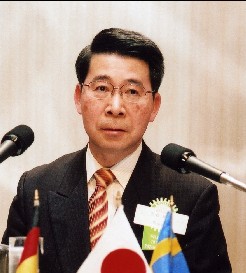Japan and the world water business
May 18th,2005
United Nations Technical Advisor
Mr. Kazunari Yoshimura
 ��The 20th Century was that of oil, and it is said that the 21 will be of water. The total amount of water on his planet is 1.4 billion cubic kilometers.
��The 20th Century was that of oil, and it is said that the 21 will be of water. The total amount of water on his planet is 1.4 billion cubic kilometers.
Of this total, 97.5% is sea water, and only 2.5% is fresh water. Furthermore 1.7% of fresh water is in the form of glaciers and icebergs so the amount of fresh water we can use is only 0.8%. Furthermore the amount of fresh water which is present on the earth��s surface and we can use is only 0.8%, but the fresh water we can safely drink is even less, coming to 0.008%.
��General Secretary Anan has warned us that one third of the world��s population is suffering from a lack of fresh water, and by 2025 two thirds of the people will suffer in like manner. He tells us that of the 6 billion people on earth, 1.4 billion do not have access to clean water, and that 20% of the world��s population is suffering from water transmitted diseases. A U.N. Millennium Summit was held in September 2000 with the aim to halve the number of persons needing clean water.
��Our Prime Minister pledged that Japan would be contributed 10 billion yen to the U.N. Human Safety Security Fund.
��In March 2003, the 3rd World Water Forum took place in Tokyo. 182 countries participated, but there was a clash between those desiring to privatize water utilities and those opposed to this who argued that privatization of water utilities would deprive ht poor of their living rights.
��Investments in fresh water systems and waste water disposal are quite large being 4 to 5 billion yen in 2005, and reaching from 7 to 10 billion yen by 2010.
Regarding privatization in the West, in 1989 Thatcher��s government in Britain privatized their water systems due to shortage of public funds, while setting up an organization to oversee developments such overcharging. Such organs as DWI for water quality, NRA for water disposal, OFWAT to control charges were given authority for control, and today water utilities in England and Wales have been almost 100% privatized.
��In France, where there are many small localities, water has been a private business from 150 years ago. With Vivendi leading, 3 companies control 90% of the market.
��In America, government subsidies were stopped in1991, and private money entered the field. At first, America companies monopolized the market, but since the latter half of the 90��s, the large water companies of France and Germany bought them up, and today 35% of American water systems are run privately.
��There are 10 large water companies in the world today, but today 2 French firms and one German control 80% of the world market.
��In April 2004, the French proposed to ISO the idea for an international standard for service activities regarding fresh water supply and waste water disposal.
��The idea is to establish an international standard for providing water services at an appropriate cost.
��Although we give much respect to the ISO, our government takes the stand that it is a private organization. However, ISO decisions when adopted by the TBT become compulsory.
��In January this year, at the Paris Conference the first world standard for water was adopted according to ISO rules. Therefore, advanced nations lacking standards and third world nations can refer to Japanese standards, as in Japan in every corner of the country water can be freely taken from the nearest tap.
There are problems of increasing cost for maintenance, disparity between regions, the cost of dams, etc.
��America has stated its interest in the Asian water market (annual income of 6 trillion yen) and the French because of low country risk. The French are interested in the privatization of our water utilities and my offer multi-infra services.
��There are 3 alternatives in the future of the water business in Japan; to enlarge the scope of privatization; to establish water corporations in the French manner; to completely privatize.
��The 21st century is the water century. The international framework will grow in importance, and the international water business will become more intense competitively.
��Japan must create a more efficient business model as soon as possible.